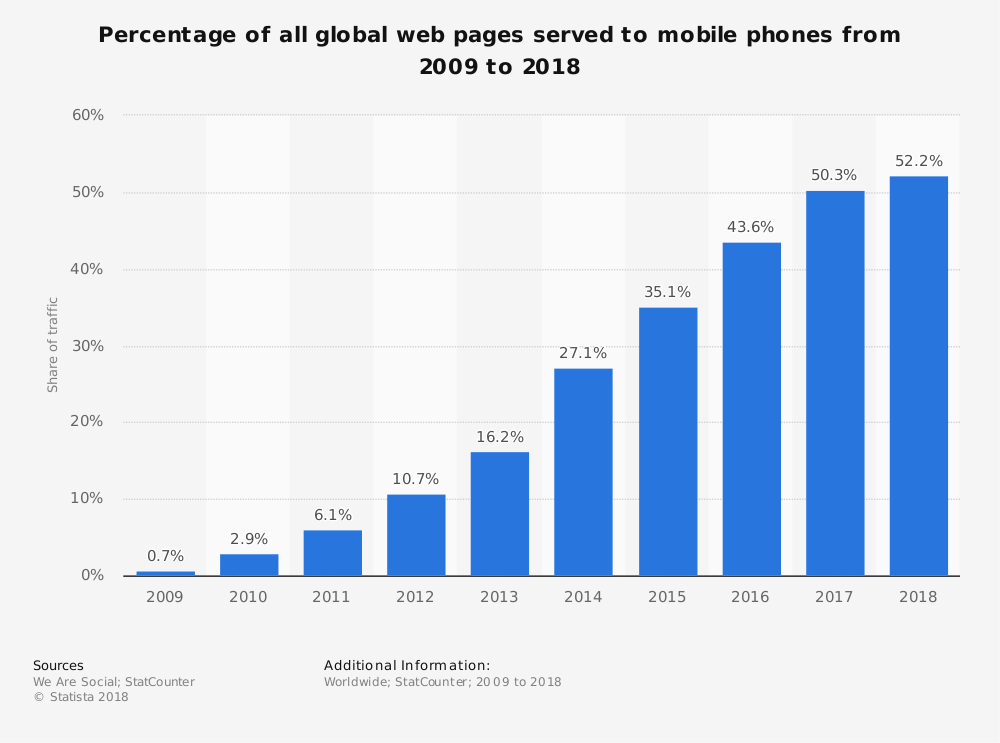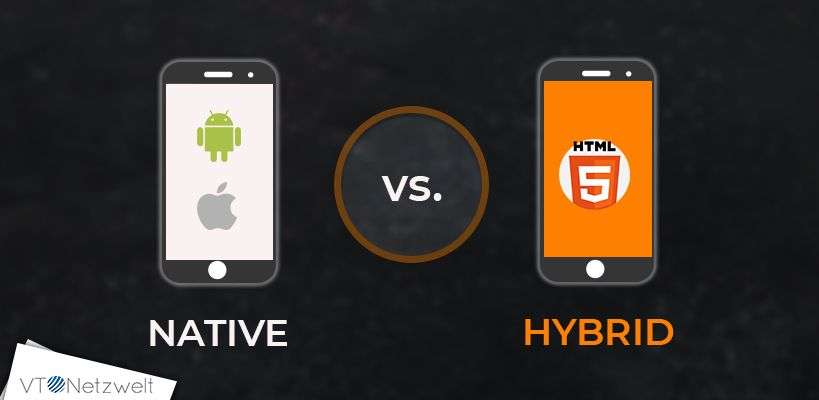Summary of the Article
Have a project in mind?
Schedule a CallNative app development vs hybrid app development
Summary of the Article
The strong growth of the smartphone market in recent years has led to the share of mobile phone website traffic to 52.2% in the year 2018.

The availability of cost-effective smartphones has led to an increase in our dependency on smartphones thus making it difficult for the developers to choose between Native mobile app development and Hybrid app development.
Importance of UI/UX in mobile app development
Before we look into the Native & Hybrid app development platforms, there is one most important aspect of mobile app development that needs to be considered i.e., your customer.
Your customer is least concerned about the technology or the platform that power the app they are using.
Most users are concerned about what they can do with the app rather than what goes into making them. So User Experience and User Interface is the most important aspect of any mobile app.
79% of consumers try any app either once or twice if it failed to work in the first attempt while only 16% of the users would give it more than two attempts.
Poor user experience discourages users from using an app.
Native & hybrid apps – A quick overview
-
Native app development
A native mobile app is an application created for use in a single particular platform or device, like Android, and iOS
A native app is specially made and coded for a specific mobile platform in its native programming language –
- iOS (Objective-C or Swift)
- Android (Java, Kotlin)
There are different guidelines for each of these platforms and developers need to stick to them as they differ in typography, graphic styles, gestures, visual effects, data entry, etc.
-
Hybrid app development
A hybrid app is created as a single app for use on multiple platforms like Android, iPhone, and Windows.
Hybrid applications are actually native apps and web apps combined together.
It is a single product that works on many operating systems like iOS, Android, Windows, etc.
They look and feel like a native application but are actually run by the company website. Created with HTML5, CSS, and JavaScript, it is basically a web-based program put in a native app shell and connected to the device hardware.
Advantages of native app development
-
Smooth performance
In native mobile app development, we have to do coding for different platforms using different programming language specific to each operating system.
So, we have different versions of a single application specially made for each platform. Being specific to that operating system, it runs smoothly over it.
-
Speed
Considering the application has been optimized for iOS or Android OS, it will achieve higher marks in speed and performance tests.
While developing native apps, everything is considered including the utilization of the memory and the battery.
It is also very easy in native app development to implement gestures support for the app and integrate new functions.
-
User experience
It is very important for mobile apps to make that good impression in order to not get deleted immediately after installing them.
In native apps, the feel and experience are much better with better scrolling, specific gesture recognition, profound effects and animations, much more appealing elements and so on.
-
Data protection & security
In order to protect your data, the full efficiency of hardware resources is required and that is only possible in native app development.
-
Flexibility
Native apps offer fast access to inbuilt device utilities like the camera, GPS, calendar, microphone, and other functions of the smartphone.
However, hybrid app development has certain limitations while constructing the interface because one single app will be used on multiple platforms.
In native apps, without any restrictions, everything can be implemented that the technology has to offer.
-
Personalization
With so many Android devices available in the market with different screen sizes, only native app development is the way of adjusting the layout on each of them.
Disadvantages of native app development
-
Development time
Native apps need more time to develop as compared to hybrid apps.
Creating and implementing the design for every device dimensions like numerous varieties of Android, iPhones, tablets, etc takes longer to complete the app.
-
Development cost
Developers usually have specialization in a single platform, be it iOS, Android or any other. In building a native app, you will need as many development teams as the platforms you want the app to be created on.
Multiple development teams imply multiple budgets. Also, future changes or updates will draw costs multiplied by the number of teams.
Advantages of hybrid app development
-
Decreased cost of development
If you are budget-centric, app development occurs only once for all the platforms (Android, iOS, Windows) and you don’t need to hire different programmers.
-
Maintenance
As we already know hybrid apps are web apps incorporated in a native shell, so its content can be updated as many times as you need or want. So, hybrid apps have low maintenance.
-
Shorter time to market
How quickly do you want your app to go live? As there is a high competition in the market and the same idea being pitched by more than one entrepreneur, you want to introduce your app to the target audience as quickly as possible. If that’s the case, then you should go for the Hybrid App.
Disadvantages of hybrid app development
-
Performance
Hybrid apps add an extra layer between the source code and the target mobile platform, more particularly the hybrid mobile framework. It can result in loss of performance but it varies from application to application.
According to the statement by Mark Zuckerberg (Founder of Facebook) – “The biggest mistake we’ve made as a company is betting on HTML5 over native.” Facebook migrated its mobile app from HTML5 to native clearly indicates a significant difference as far as enterprise applications are concerned.
-
Debugging
The extra layer from the hybrid development framework also makes debugging a bigger affair. Developers have to rely on the framework itself to play nicely with the targeted operating system without introducing any new bugs in the app.
-
User experience
As compared to native app development, it is difficult to maintain a proper user experience between the Android and iOS apps. If you focus more on iOS, the user experience would worsen for Android users.
Why choose native app development?
There are many different directions you can take your app. However to make the right choice, it is necessary to understand the differences between them and their pros and cons as each option has its own strengths and weaknesses, and the final decision must depend on your business needs.
The discussion is still relevant because, for both of the approaches, there are distinct advantages and disadvantages.
Single source code, cross-compatibility, easy updates, lower development costs and availability of resources make hybrid apps seem very appealing.
However, initially it may seem a better option but later on, the company is probably going to spend more time adjusting and fixing the app because of performance-driven issues.
Native apps are still better as their feature set is regularly updated, making it hard for the development of hybrid apps. There are many benefits of native apps over hybrid apps and at the core lies much better performance and a highly responsive user interface.
Native apps offer fast and easy access to inbuilt functions, for example, camera, calendar, GPS, address book, etc. Furthermore, it provides the best in class security, the best in class performance, and access to all native APIs.
The initial investment in native apps may be higher than the hybrid but in the long run, it will save more money and time at the same time offering a great user experience and app performance.
In the case of hybrid apps, if you need to add some exclusive features then its development requires more effort from the developers to write them from scratch. This is where the native app seems a better choice.
Summary
So who is the winner between Native and Hybrid app development?
Well, it totally depends upon your business requirements.
You can choose Hybrid App Development if you are looking for faster development and shorter time to market without spending much money.
But when you hire an app developer or contact a mobile app development agency they are likely to suggest you native app development.
Building native apps will surely need more investment in terms of both time and money but the end product will offer personalized service for your customers and will help your enterprise in building a solid reputation in the market.
Hire our experienced mobile app developers
Our mobile app development services help our clients unleash the power of mobile by building world-class iOS and Android solutions. Our expertise and consistency in building & delivering complex mobility solutions and our process-oriented approach, has enabled us to become a trusted partner for various leading companies across the globe.
Native app development
iOS app development
Leveraging agile methodology and experienced iOS developers, we provide our clients with custom solutions keeping in mind the design and development guidelines related to the Apple Ecosystem – iPhone, iPad, and Apple Watch.
Android app development
Being one of the leading Android app development company, we help our clients unleash the real power of Android using the highest standard of code quality. We offer user-centric and robust android apps with innovative interfaces.
Cross-platform app development
React Native app development
React Native is an innovative technology developed by Facebook comprising the most advanced cutting-edge features to develop mobile applications for iOS and Android. Using React Native, we can build mobile apps with a high-quality and powerful UX for multiple devices and operating systems using single technology and a single code base which results in faster development and saves money.
Flutter app development
Flutter is a cross-platform app development tool offered by Google that allows us to build native apps on the iOS and Android ecosystem from a single codebase. Being one of the leading app development company, we offer Flutter app development services to our clients across the globe to develop next-generation mobile apps that offer their business the flexibility and expedite the app development process.







Cool article giving equal emphasis to both Hybrid and Native Apps. I would still prefer native over hybrid as native approach of development is more business oriented and score a bit more in terms of user experience which is important.
Thank you Sameer, we are glad that you liked the article.
I have been researching on this topic from quite some time now and have analyzed different sources and I must admit that your content has given me a much clear view for customer wanting to opt for a better app development.
Hi Tom, thanks for the appreciation. We are glad that you liked the blog.
This article is great. Was looking for this past many days.
Hey,
Thanks for putting together this post on native apps vs hybrid apps development. I particularly find your thoughts on the time to market very interesting.
I’m glad to find another amazing mobile app development blogger.
Cheers.